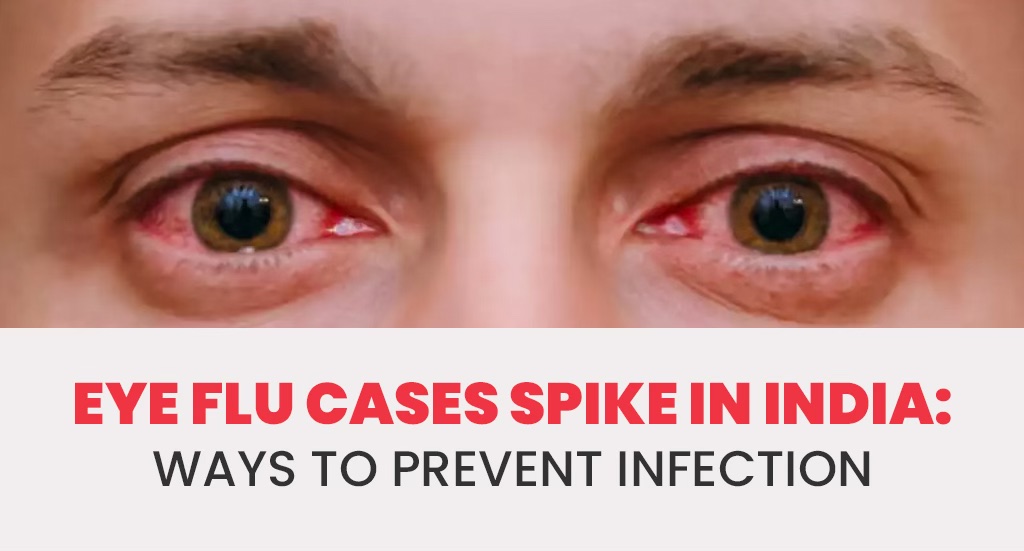The monsoon season gives relief from the hot temperatures, but brings with it a slew of ailments. Eye flu, also known as viral conjunctivitis, typically manifests as red, itchy, or irritated eyes and is more common in this weather. Conjunctivitis cases are rising in various cities across India. New Delhi’s All India Institute of Medical Sciences (AIIMS) in Delhi is reporting approximately 100 cases a day. Mumbai has seen a 15-20% increase in cases among children and adults. The situation is very similar in Chandigarh. There has been a spurt in cases in Agra as well.
As the monsoon season approaches, the likelihood of acquiring conjunctivitis increases because moisture and humidity in the atmosphere create the ideal environment for bacteria and viruses to thrive and spread.
Conjunctivitis, also known as pink eye, is an inflammation or infection of the thin, transparent layer of tissue (conjunctiva) that covers the white part of the eye and the inner surface of the eyelids. Preventing conjunctivitis involves taking measures to avoid its transmission and reducing the risk of infection.
The symptoms include “pink or red colour in the white of the eye(s); swelling of the conjunctiva and/or eyelids; increased tear production; feeling like a foreign body is in the eye(s) or an urge to rub the eye(s); itching, irritation, and/or burning; discharge (pus or mucus); crusting of eyelids or lashes, especially in the morning; contact lenses that feel uncomfortable and/or do not stay in place.”
In most cases, viral conjunctivitis produces a watery discharge, whereas bacterial infections produce a pus-like discharge.
Rainfall increases the amount of dust, pollutants, and allergens in the air, increasing the risk of conjunctivitis. Here is some critical information for treating conjunctivitis.
Here are some ways to prevent conjunctivitis:
- Practice good hygiene: Wash your hands frequently with soap and water, especially before touching your eyes, after using the restroom, or when you have been in public places.
- Avoid touching your eyes: Refrain from rubbing or touching your eyes with unwashed hands, as this can transfer bacteria or viruses to your eyes.
- Do not share personal items: It is recommended to not share personal items like washcloths, towels, makeup, contact lenses, or cases with others.
- Properly clean and store contact lenses: If you wear contact lenses, follow your eye care professional’s instructions for cleaning and storing them. Replace disposable lenses as recommended.
- Avoid contact with infected individuals: Conjunctivitis is highly contagious, so avoid close contact with anyone who has the infection until they are no longer contagious.
- Practice good eye hygiene: If you have conjunctivitis, take extra care to wash your hands frequently, avoid touching your eyes, and use separate towels and linens to prevent spreading the infection to others.
- Avoid swimming in pools with high chlorine levels: Chlorine can irritate the eyes and worsen conjunctivitis. If you or others have the infection, it’s best to avoid swimming until the infection clears.
- Stay home from school or work: If you or your child has conjunctivitis, it’s essential to stay home until the infection is no longer contagious to prevent spreading it to others.
- Clean and disinfect frequently touched surfaces: If someone in your household has conjunctivitis, regularly clean and disinfect doorknobs, light switches, countertops, and other commonly touched surfaces to reduce the risk of transmission.
- Avoid using expired or contaminated eye drops or medications: If you have an eye infection, follow your doctor’s instructions carefully regarding the use of eye drops or medications, and avoid using products that may be contaminated.
Remember, if you suspect you have conjunctivitis or any eye infection, consult with a healthcare professional or eye doctor for proper diagnosis and treatment. They can provide appropriate advice on managing the condition and preventing its spread to others.








